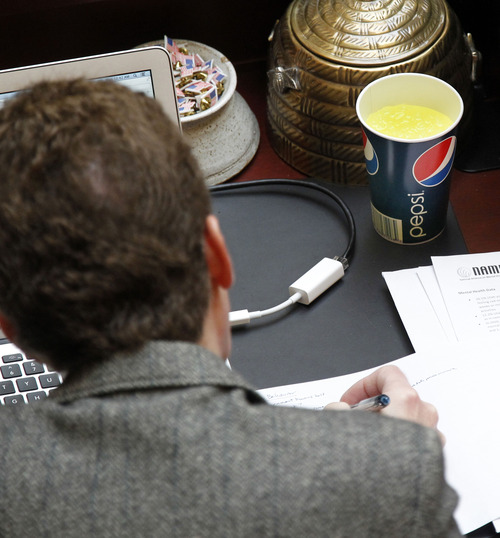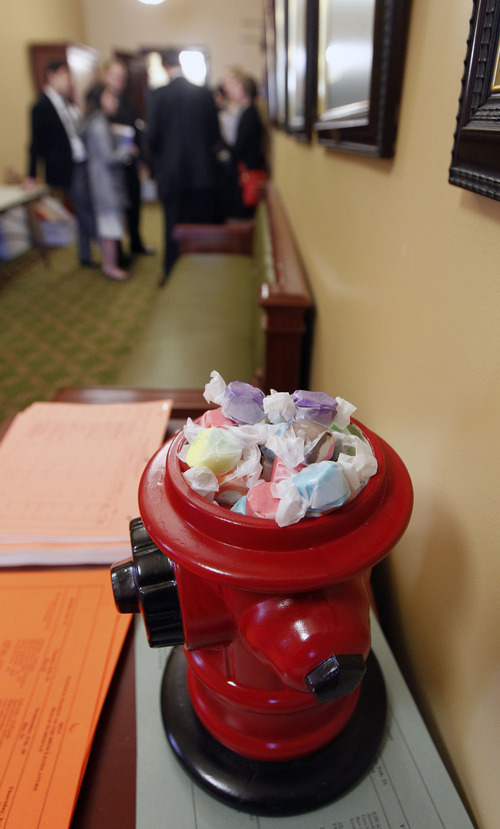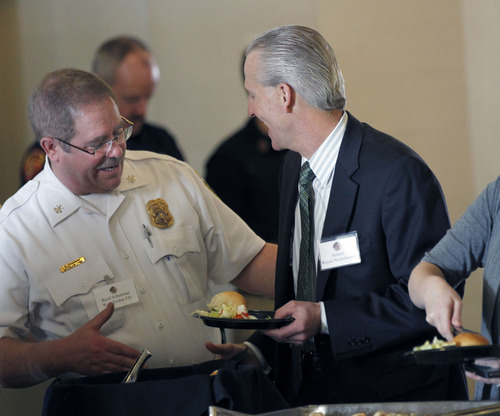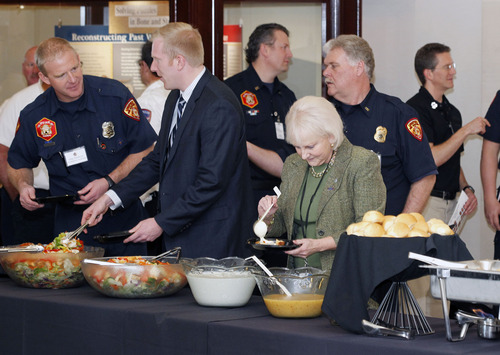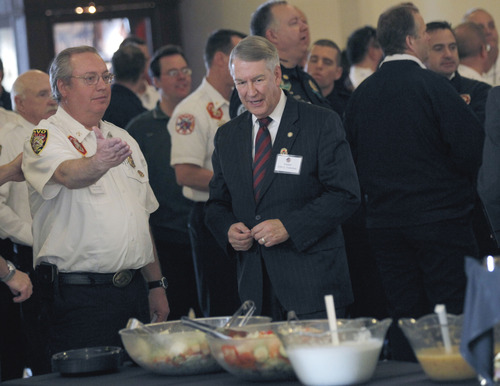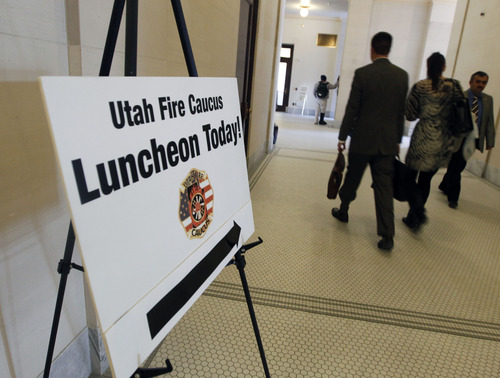This is an archived article that was published on sltrib.com in 2013, and information in the article may be outdated. It is provided only for personal research purposes and may not be reprinted.
After a protest in the Governor's Office, environmentalists begin chanting and waving signs calling for action against air pollution as they march upstairs to the Utah House chamber. But they find legislators have adjourned, so no one is there to hear them. They soon disband.
A few hundred feet away in a roped-off area in the Capitol Rotunda — where signs advise that an event there is private — dozens of legislators sit at tables with linen and silverware enjoying a buffet paid for by multilevel-marketing firms that sell natural health products.
A pianist plays soothing music that echoes through the marble halls. As the nearby protesters sporadically chant to no one in particular, the pianist plays louder and faster to counter their noise. It allows multilevel marketers to talk relatively unmolested about their issues to dining lawmakers.
Such contrasts in access to legislators earlier this month illustrate why special interests again are busy offering free meals, receptions and entertainment to Utah's part-time legislators during their annual 45-day session.
Social calendarsshow that special-interest groups scheduled 103 such events this year. Senators, for example, are offered free lunches on 32 of the session's 33 actual workdays.
"It makes it more difficult to get access" for groups who don't offer such freebies, says Steve Erickson, a lobbyist for the Crossroads Urban Center and the Utah Audubon Council, which cannot afford them.
"It's about more than just access," says Linda Hilton, director of the Coalition of Religious Communities, which advocates for the poor.
Groups that do offer amenities "get more time. When legislators come out to talk to us, we have two minutes in the hall — five if we're really lucky. When you invite someone to dinner, you can talk to them for an hour and you have their undivided attention."
Most legislators say the freebies don't sway their decisions and assert they provide access to all sides.
"I don't see any of my colleagues limiting their availability to anyone," says House Majority Whip Greg Hughes, R-Draper.
He notes that in the short session, when lawmakers are considering hundreds of bills and issues, they hear from all sides — by email, talks in the hallway, protests, displays, lobbyist meetings or from those "who may try to hand you a cupcake and a pamphlet at the same time."
—
What is given • Until three years ago, laws required groups to disclose how much they spent on meals and treats for legislators. But then a law restricting gifts created a big loophole. Disclosure is no longer required for meals or treats if a majority of legislators, or even a majority of a small committee, is invited to an event.
While formal disclosure of such events and costs no longer occur, The Salt Lake Tribune compiled a partial list of them through legislative social calendars, though spending on the events is unknown.
In the 33 workdays of the session this year, calendars show the Senate is offered 32 lunches, 25 sponsored snack breaks, 11 breakfasts, 13 receptions, 10 dinners, seven "family events," a ski competition (including free day passes for family members) and some free health screening.
The House had a bit less: 26 sponsored snack breaks, 16 lunches, 13 receptions, 10 breakfasts, six family events, the ski competition and the free health screening. (A list of events and sponsors is online at sltrib.com.)
Events include a Valentine's Day dinner and show for lawmakers and spouses by RRJ Consulting, a lobbyist firm, that included dinner at Discovery Gateway followed by the movie "Lincoln" at the nearby Gateway Megaplex theater.
Hale Centre Theatre has a dinner planned followed by the play "Chitty Chitty Bang Bang" (lawmakers must pay $18 for the show). The Sundance Film Festival and Zions Bank are hosting a dinner and a post-festival film screening of "Austenland."
A breakfast sponsored by McDonald's included a visit by Ronald McDonald. Calendars say family events are being sponsored by and held at The Leonardo, Thanksgiving Point, the Living Planet Aquarium, Clark Planetarium, Discovery Gateway, the Utah Museum of Natural History and the Fort Douglas Military Museum —many of which receive funding from the Legislature.
—
Who's behind perks? • The Senate is offered twice as many free lunches because it allows special interests to pay for its "caucus lunches" on days when senators meet to discuss legislation and strategy. In the House, members pay for those lunches on their own — although they may request reimbursement from the House.
The health care industry provides a good example of groups sponsoring meals and events for lawmakers.
While at least 90 health care-related bills and bill files have been opened this year, health-related groups that have sponsored events include: 1-800-CONTACTS, the American Heart Association, Health Forum of Utah, Huntsman Cancer Hospital, Intermountain Healthcare, Johnson & Johnson, Merit Medical, Molina Health Care, People with Disabilities, Utah Physical Therapists, Primary Children's Medical Center, Utah Association of Health Underwriters, Utah Chiropractic Physicians Association, Utah Dietetic Association, Utah Health Information Management System Society, Utah Health Plans, Utah Hospital Association, Utah Medical Association, Utah Natural Products Companies, Utah Pharmacists and the Utah Public Health Association.
More than 120 education bill and bill files were opened, as education groups lined up to sponsor events, including Education First, Four Corners School of Outdoor Education, Friends of Higher Education, Higher Ed, Parents for Choice in Education, Utah State University and the Utah Women & Education Initiative.
Many, but not all, of the top campaign donors to legislators also sponsored events. The Utah Association of Realtors is the top donor to legislators ($188,000 in the past cycle), and it is also sponsoring a lunch at Little America this year.
Other top 10 donors sponsoring events include EnergySolutions, the Utah Medical Association, Comcast and Education First.
—
The how and why of perks • A lunch last Monday in the Capitol's Hall of Governors by the Utah Fire Caucus of firefighters shows what a typical event is like —and why it is offered.
Gov. Gary Herbert dropped by before the event to thank fire chiefs for their service. Organizers quickly then ordered fire chiefs and firefighters back "to the staging area."
They stood near the head of the catered buffet line — which this day featured tossed salad, chicken, potatoes, steamed mixed vegetables, rolls and assorted juices, soft drinks or water.
"We've assigned them to sit with legislators from their areas," says Murray Fire Chief Gil Rodriguez, chairman of the caucus. "We had them study their pictures so they will recognize them."
Legislators arrive, pick up name badges and are welcomed by firefighters from their area. They often go through the buffet together and sit together. Posters list 49 sponsors who are paying for the lunch, mostly firefighter unions and manufacturers of firefighting equipment.
As a firefighter plays a bagpipe, the groups chat. At some point, firefighters make sure lawmakers get a paper listing nine bills they care about — ranging from amendments to the state fire code to fireworks amendments, wildland fire bills and tweaking arson penalties.
"We usually get about 80 legislators [out of 104] to our lunch," Rodriguez says. "It gives us a chance to show our appreciation. It also lets us explain our priorities to everyone at the same time."
He says the group also has a few people at the Capitol daily to lobby as needed. Firefighters also show appreciation daily by filling miniature plastic fire hydrants around the Capitol with salt water taffy for lawmakers and visitors. "We constantly try to get our message out," Rodriguez says.
A short program features a few speeches by fire chiefs and lawmakers. As legislators leave, they are given a canvas "swag bag" marked with the fire caucus logo, and a first-aid kit inside. Lawmakers are allowed to receive inexpensive gifts worth up to $10 by law.
—
Perk perception, changes •Rep. Kraig Powell, R-Heber City, a bit of a maverick who has been critical of freebies for lawmakers, chooses to attend the firefighters event. He wanted to meet with fire chiefs from Heber City and Park City in his district to hear their concerns and views.
Still, he says he tries to pay for his own lunches at events when it is not overly difficult to identify a sponsor who can estimate costs and take a check. Powell laments that the system has evolved to the point that many groups feel like sponsoring events is the only way to get their views across to lawmakers.
"I think that interest groups recognize that there is a greater level of contact with legislators if you can arrange an event. It's a different type of contact than simply sending an email or sending a note into the floor," Powell says. "It looks bad. ... It's a gift, and that is not appreciated by the public."
The Legislature made a change this year that could reduce such events, or attendance at them, in the future.
In the past, lawmakers received a $61 per diem amount from the state for meals during the session — and all the free meals allowed them essentially to pocket that as extra salary. By raising the base pay of lawmakers, rules now require that receipts be produced to receive reimbursement for lodging and meals — a system that could reduce the financial incentive to accept free meals.
No one, though, expects the change will end Utah's Capitol freebies altogether.


